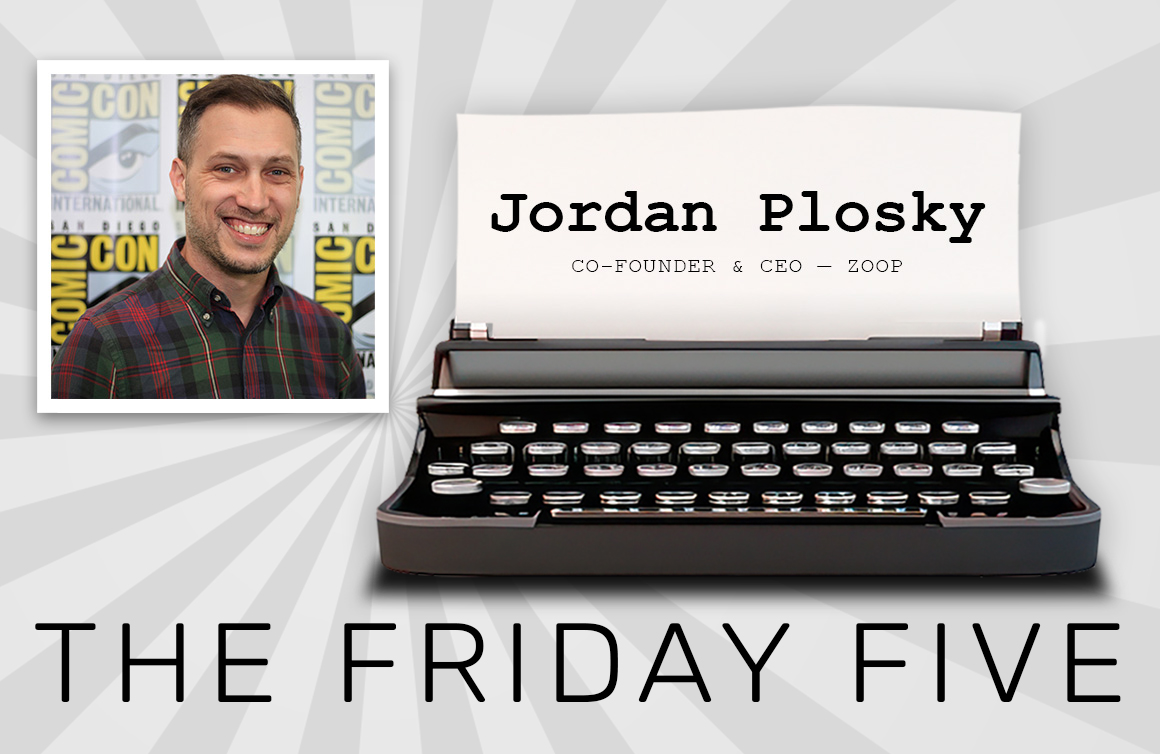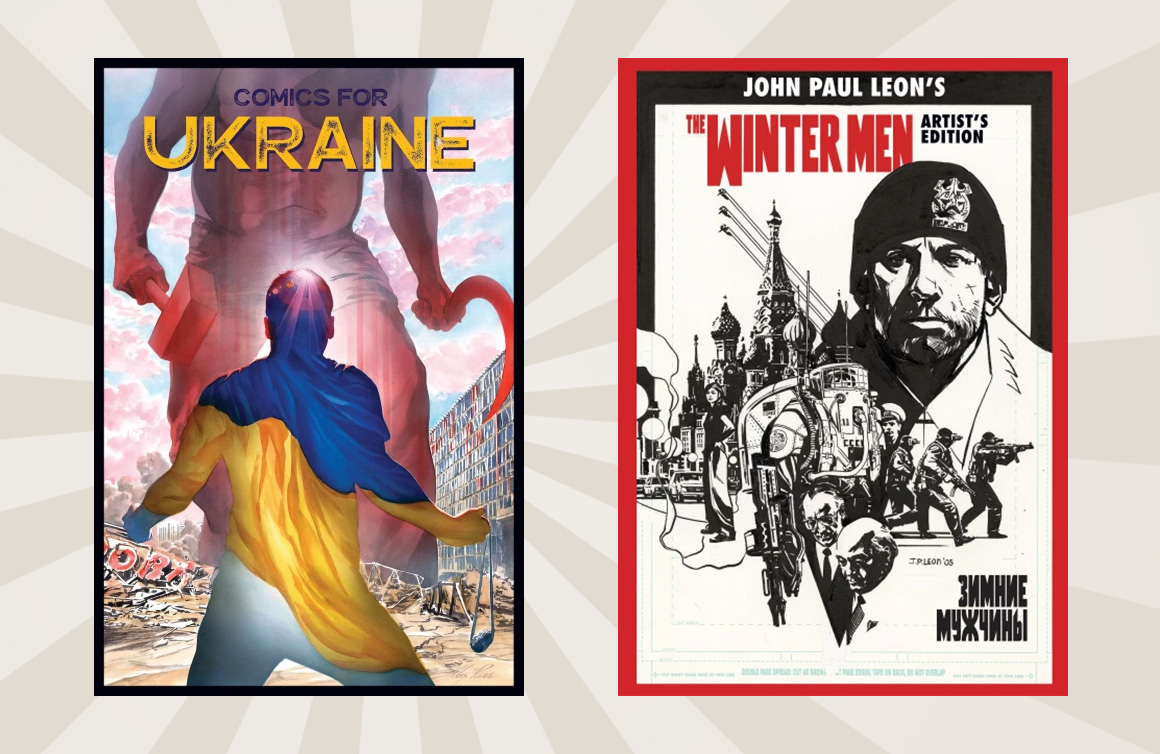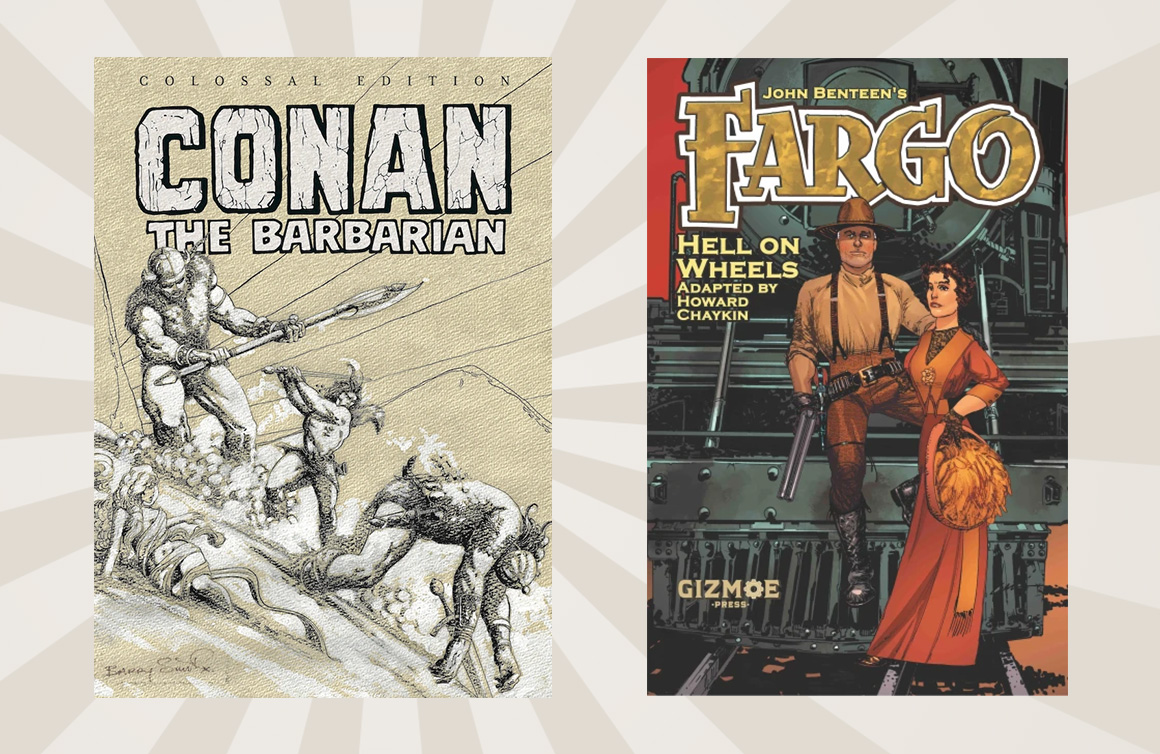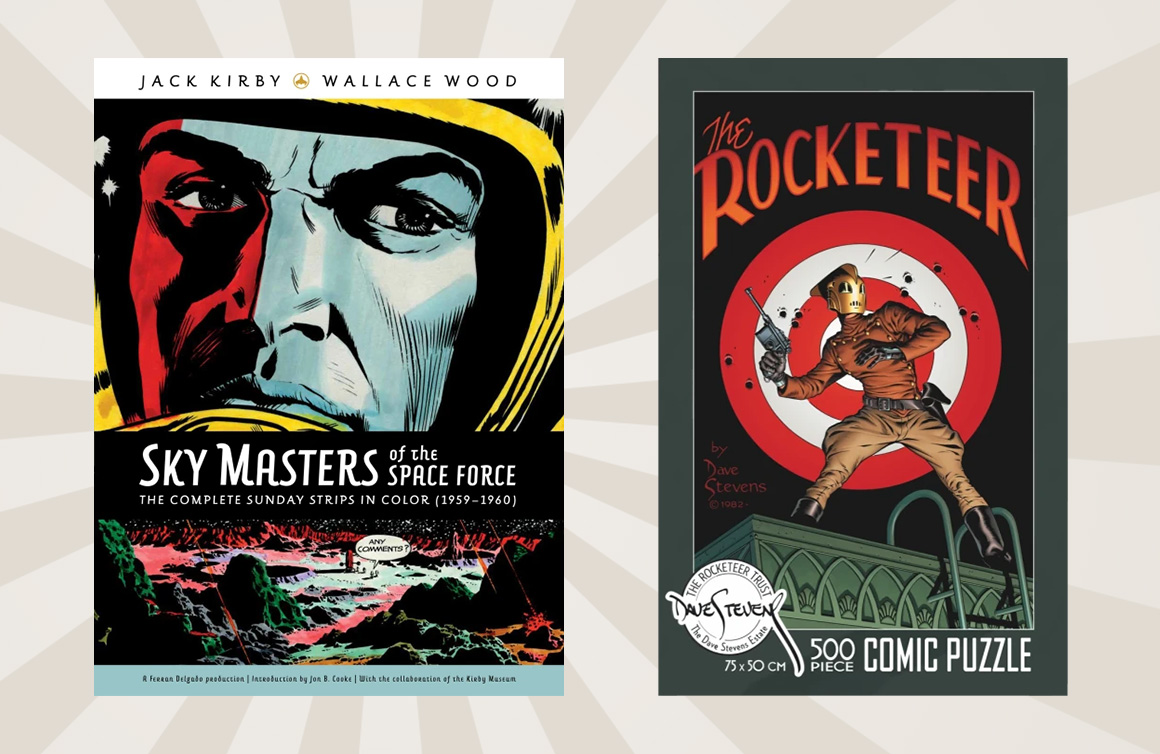What inspired the Zoop business model?
Zoop was a pandemic baby. We were all quarantined and stuck in our homes. I was losing my mind and needed something positive to focus on.
I started having conversations with people about what they were seeing and trends they were noticing, and tried to figure out a potential business to start.
Zoop is the second business I’ve started. My first was ComicBlitz, a subscription-based, all-you-can-read digital comics distribution platform. I wound up selling that company in 2018 and got a normal day job. Then the pandemic happened. I just needed something positive to focus on, needed to fill my time and keep my mental health strong. And, for me, that was starting another business.
I reconnected with my now co-founder, Eric Moss. When I first met him, he was at IDW where he was the person I licensed content from for ComicBlitz. We were noticing some trends in the industry. At the time of the pandemic, there was really only one major distributor of comic books, Diamond Comics. They basically had a monopoly on comics distribution, but when they had to shut down due to COVID regulations, other players stepped in. Penguin Random House now distributes Marvel and Lunar distributes DC Comics. Things have fractured a lot. At that same time, AT&T purchased Warner Bros., home of DC Comics. They were letting people go left and right and they slashed their publishing output by about 25 percent. What all of this added up to was fewer opportunities and less work — less money — for creators.
On the other side of things, e-commerce exploded. It experienced 10 years’ worth of growth in the first few months of the pandemic. Crowdfunding had also taken off. We saw companies like Kickstarter and Indiegogo and realized that while crowdfunding itself is an excellent avenue, it’s really difficult to do. The people running these campaigns are writers and artists — they’re not finance people, they are not marketing people, they’re not logistics people. Figuring out how to get your book printed, your t-shirt manufactured, and your stickers, pins, art prints, and all that stuff done isn’t easy. Having to take the time to fulfill and send out hundreds of packages — potentially thousands of packages — to people, takes time away from your freelance work or other creative work.
When Eric and I saw the rising trend of crowdfunding, we saw a place where we could help. We know plenty of people who love the idea of crowdfunding but don’t do it because of all that extra work. When you self-publish, it’s good to have a built-in team like Zoop as opposed to having to handle everything by yourself.
There wasn’t a full-service crowdfunding platform out there. Zoop fills that gap.

How does Zoop redefine crowdfunding for comic book readers, creators, and publishers?
One of the biggest complaints on the backer’s side of crowdfunding is the fear of campaigns not being fulfilled. People are concerned that they may never get something back once they give their money. That does happen sometimes. Creators go into crowdfunding campaigns with the best intentions, but sometimes life happens and it throws them off track, or they didn’t budget properly because they didn’t know what they were doing, or they didn’t have the support. No ill will was intended but all the minutia that goes into a crowdfunding campaign leads to a percentage of them never being fulfilled.
Zoop is the middleman and a guarantor, if you will, of the fulfillment of these campaigns. I hope that we can build up that level of trust with backers to know that we’ll get it done and help with the fulfillment. We’re eliminating barriers and points of friction.
The technology that exists in some crowdfunding platforms is antiquated if you think about it. The tiered reward system of Kickstarter on Indiegogo is 15-year-old technology that came before everybody shopped online and was used to Amazon, Walmart, Target or wherever — you click on something, add it to your cart, and check out. With other crowdfunding platforms, backers have to select one reward tier to purchase or it’s a pledge. That’s all you’re allowed to do. Sometimes you get a whole bunch of stuff in a reward tier that you don’t want because you only wanted that one really cool thing, but now you’re stuck with other items that maybe you didn’t want that you that you had to spend money on in order to get the one thing that you really wanted. Not only that, there’s the annoyance of having to read through ever-growing lists of items in each successive tier on a campaign page.
Zoop eliminates all of that. Our user interface is set up so that you can go to a campaign page and choose items on an à la carte basis. You can buy one standard edition, one signed edition, an add-on. You add what you want to your cart and checkout.
We also collect all the credit card and shipping information during the main campaign. One of the other points of friction is that survey. A lot of people find them really annoying. You pick a reward and spend money on a campaign. Then months later when it’s ready to be fulfilled, you get a survey asking you not only for your address, but for you to also pay again for shipping. People feel like they already paid for their reward, why do they need to take out their credit card again. There’s friction there. And, a lot of times people miss those survey emails and then they never get the rewards because the creator doesn’t have their address to actually send them the reward.
We’ve tried to make the entire process more efficient with less friction and easier to understand. We’ve updated the process for today’s online consumer.

What creative trends have you seen evolve over the past couple of years?
I definitely think that there’s an increase in the sheer numbers of projects that are happening in the world of crowdfunding. People are embracing the model more and more. I know it sounds cheesy to use this term, but crowdfunding does democratize getting your product out there. Crowdfunding levels the barrier to entry for self publishing.
Creators do not have to pitch publishers, get editorial insight, and make changes to their story; they aren’t waiting 12 months for the book release. There is a lot more control as a creator through crowdfunding and self publishing.
One of the things about Zoop is that we work with established names. We’re doing a Jack Kirby campaign right now. We just wrapped a campaign for Howard Chaykin. Howard Chaykin wants to tell the story. He doesn’t want to have anybody give him notes or wait 12 months for his book to hit the store shelves. He wants control over his property. Those are the benefits of crowdfunding the creators — they aren’t giving up a piece of ownership or splitting that intellectual property with a publisher and potentially feeling like they are getting a raw deal. Creators maintain 100-percent ownership.
And then they can go pitch to a publisher because they have more leverage.
What people might not see is that creators can still take a successfully crowdfunded book to a publisher. If anything, that’s a feather in your cap — showing that you are willing to put in the hard work and demonstrating that you have a fan base. A lot of publishers looked at creators’ social media numbers a few years ago as one of the criteria for hiring them or not. Crowdfunding is like that nowadays.

What have been some of the standout projects for you?
The project that really put us on the map was one in memory of John Paul Leon. He was a fantastic artist who died in 2021 at the age of 49. An artist’s artist — some would call him a master. He illustrated interiors on the Earth X books from Marvel, the ones with the Alex Ross covers. He was part of DC’s Milestone Comics’ launch in the ’90s.
He had his own book called The Winter Men that was published by Wildstorm when they were part of DC Comics. His friends Bernard Chang, Tommy Lee Edwards, and Scott Dunbier took all of his original art from that series and published an oversized 11″x17″ artists edition of The Winter Men through us. That campaign was very high-profile. People were still mourning the loss of John Paul. The money raised went towards his daughter’s college education and people felt good about that. It was a beautiful book and raised nearly $200,000.
We did another campaign for a 12″x17″ Conan the Barbarian book featuring artwork by John Buscema, Gil Kane, Barry Windsor-Smith, and others.
If you know anything about comic artists, this list of contributors will blow your mind. We did a book called Comics for Ukraine. I mentioned Scott Dunbier earlier — he’s an editor at IDW and was at Wildstorm with DC. He’s been in the industry forever. When the war in Ukraine broke out, he felt he needed to do something for Ukrainian refugees so he put together a roster of A-list talent for a benefit anthology. The project includes work from Alex Ross, Bill Sienkiewicz, Arthur Adams, Dave Johnson, Kurt Busiek, Walter Simonson, Jill Thompson, Joe Jusko — it was a murderer’s row of legendary artists and creators. The campaign raised $100,000 for Operation USA to help people displaced by the war in Ukraine. Scott received the Bob Clampett Humanitarian Award at the 2023 Eisner Awards for his work. It’s something we’re very proud of.
We’ve been fortunate. As I mentioned, we’re working with the Jack Kirby Museum right now and Howard Chaykin. We have a campaign live right now with Cullen Bunn — he’s the creator of The Sixth Gun and he’s written for Deadpool and X-Men. We worked with Dan Panosian, Tony Harris, Jorge Molina, Matt Lesniewski — whose book with us got picked up by Oni Press and is on store shelves now — Ron Marz, Andy Lanning, Des Taylor.
We’ve amassed an impressive roster of very notable creators and those high-profile campaigns keep bringing more creators and more supporters to the platform. We’re very grateful for that.

Can you share some advice to help creators wanting to crowdfund on Zoop?
The funny part of me just wants to say, “don’t worry about it just come to us, and we’ll take care of everything.” But realistically, even with a platform like Zoop supporting them, it’s up to the creators to bring their crowd to crowdfunding.
It’s important to build up your fan base ahead of the campaign — get people excited and let them know something’s coming. A lot of the promotion, a lot of the heavy lifting and hard work comes before a campaign is launched. If you don’t have social media followers or an email list and you’re thinking about crowdfunding … just put the pieces together — how are you going to let people know that you’re doing this if you don’t have any of those communication tools built up? If you’re someone who doesn’t do social media, that’s fine but then maybe you shouldn’t be doing a crowdfunding campaign because your fan base is not going to know that this is happening.
A lot of creators don’t want to promote, they feel like they’re shilling, like they have their hand held out asking for money. To them, I say that the discomfort is short term. Once you rip off the band-aid, it gets easier and easier to just keep promoting. You can be the best creator in the world with the best story and the best art but but if you don’t tell anybody about it, no one’s ever gonna find it.
Zoop is currently preparing for its own crowdfunding campaign, an equity campaign. Instead of getting a product with your pledge, you’ll be getting a piece of ownership in Zoop. If you’re not familiar with the concept of equity crowdfunding, it democratizes investing in startups. You don’t have to be an accredited investor, you don’t have to invest tens of thousands of dollars. People can invest $100 or $250 to get a piece of ownership in the company. That puts you on the cap table, you become an official investor in Zoop. We are working on some physical rewards — some exclusive collectibles that are only going to be available through that campaign. The thing about Zoop is that we’re getting into other categories as well — card games, board games, tabletop, games, toys, action figures, plushies, figurines, statues, potentially video games, traditional publishing. Anything under that Comic Con umbrella.
We can do all these fine things with the support of the people who want to see more of it.

Learn more about Zoop and explore its crowdfunding campaigns on the platform’s website.




